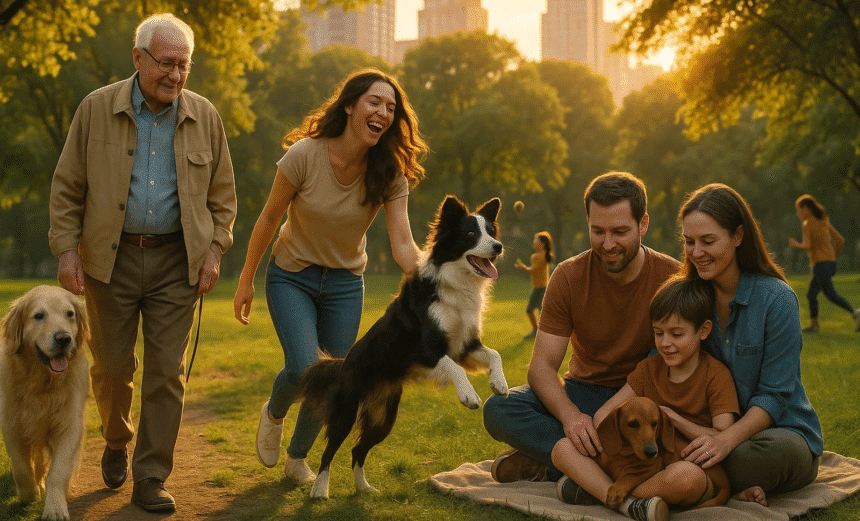Dogs have long been celebrated as “man’s best friend,” but recent research and personal stories are proving that this bond is far more than emotional; it’s a true health and happiness booster. Across the world, millions of dog owners are finding that their loyal companions not only offer unconditional love but also improve physical well-being, reduce stress, and add joy to everyday life. According to a 2025 global survey by the Pet Wellbeing Institute, 87% of dog owners believe their pets show unwavering loyalty, whether it’s by guarding the home, staying close during illness, or responding to emotional distress. Many say their dogs can detect mood changes and instinctively comfort them, often by cuddling or simply being near.
Beyond companionship, dogs are a natural motivator for physical activity. The American Heart Association reports that dog owners walk an average of 23% more than non-owners, a difference that has a measurable impact on health. Regular walks and play sessions improve cardiovascular fitness, strengthen muscles, and even enhance immunity. In fact, research shows that people with dogs have a 24% lower risk of premature death compared to those without pets. Experts link this to consistent moderate exercise, increased outdoor time, and reduced blood pressure due to lower stress levels.
The mental health benefits are equally powerful. Interaction with dogs stimulates the release of oxytocin, the “love hormone,” which fosters trust, relaxation, and emotional bonding, while simultaneously reducing cortisol, the stress hormone. A 2024 European Pet Therapy report found that 92% of dog owners experienced improved mental health after adopting their pets, with fewer feelings of loneliness and a stronger sense of purpose. This effect is particularly strong among elderly owners, many of whom say their dogs keep them socially active and motivated to maintain a daily routine.
Different breeds bring different advantages, although all dogs share the potential to enhance human happiness. Labrador Retrievers and Golden Retrievers are celebrated for their gentle, nurturing nature, making them ideal therapy and service dogs. Border Collies and German Shepherds, known for their intelligence, challenge owners mentally through training and agility exercises. Small breeds like Cavalier King Charles Spaniels and Dachshunds are perfect for those in smaller living spaces, offering affection without requiring large yards. Mixed breeds, often resilient and adaptable, bond deeply with their owners regardless of size or background.
Dog owners worldwide are eager to share their experiences. In Berlin, teacher Anna Keller says her rescue dog Milo helped her overcome anxiety after a difficult year. “He senses when I’m stressed and will nudge my hand until I pet him. It’s like he’s telling me, ‘It’s okay, I’m here.’” In Chicago, retiree James Walton credits his Golden Retriever with aiding his recovery from a mild stroke, saying, “The daily walks, the laughter, the love, it’s better than any medicine.” These personal accounts align with growing scientific evidence that the human-dog bond is mutually beneficial. Studies show dogs also experience increased oxytocin when with their owners, reinforcing the emotional connection and strengthening trust over time.
Veterinary behaviorist Dr. Lisa Moreno highlights the depth of this relationship: “Dogs don’t just provide companionship; they integrate into our emotional world. This relationship is one of the most mutually beneficial partnerships in nature.” However, she also reminds potential dog owners that with great rewards come responsibilities. Dogs require consistent care, proper nutrition, medical attention, and mental stimulation. Neglect or poor handling can harm both the dog and the owner’s well-being. Ultimately, dogs are far more than pets; they are loyal friends, health partners, and emotional anchors. Whether bounding through a park or curled up on a couch, their presence offers measurable benefits to both body and mind. For many, life without a dog isn’t just quieter, it’s emptier. And as science continues to confirm the powerful impact dogs have on human well-being, the old saying proves truer than ever: a loyal dog really is a person’s best friend.


















